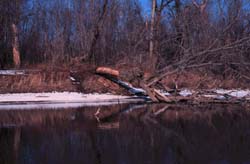
Erosion
Three fourths of the state is farmed, mostly in row-crops. With so much of the land under cultivation, erosion is a significant ecological and economic factor. Erosion results in the loss of valuable topsoil, degradation of surface water quality and the siltation of waterways.
 |
| Erosion along Illinois River |
Forest soil erodes, too, when fast-growing shade producing tree species shade out undergrowth. The herbaceous layer becomes sparse and the soil unstable and washes away more readily. Forests, particularly those on slopes or river bottoms, protect against soil erosion.
The Conservation Reserve Enhancement Program (pdf version)in Illinois encourages restoration of forest in floodplain settings. On average, erosion on cultivated land in Illinois is four times greater than in forested land, and even greater on slopes under cultivation.
Forest
products industry
Although Illinois imports much of the wood that is uses, forests and forest resources play a significant role in the state's economy. Over 65,000 people in Illinois are employed in the forest products industry. Christmas tree farms and firewood (75% of the wood used for fires is harvested from dead trees), especially in the northeastern part of the state, also add to the state's economy.
Recreation
Illinois
forests provide unique recreational opportunities, which not only serve
to refresh the city-worn soul, but benefit the economy through the money
spent in the state in the pursuit of outdoor activities associated with
forested areas.
|
|
Copyright © 2000 Illinois State Museum